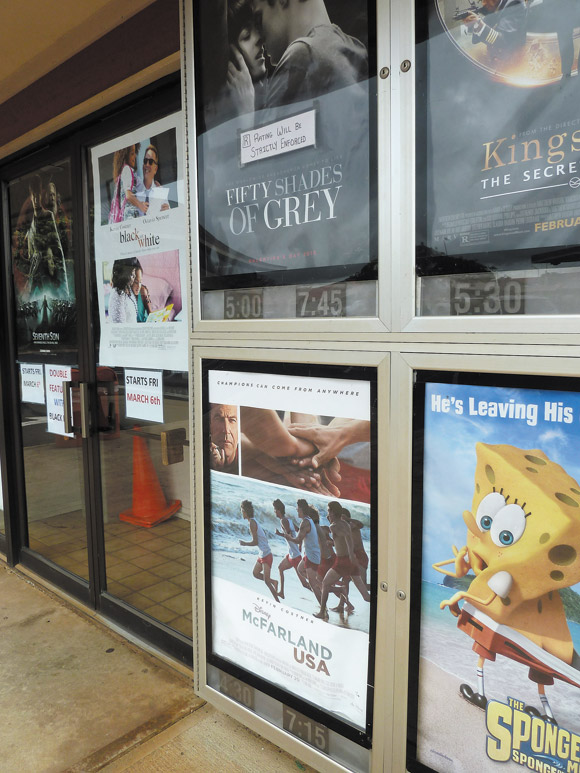Flicking Off The Old Fogey Fear

Movie posters advertise both passionate and compassionate shows. Either might reveal tales of our own innermost affairs | Jane Esaki photo
Inspiring stories don’t get much better than that.
When the movie was over, the capacity crowd clapped. I didn’t have to because it wasn’t like I was in a lit-up auditorium amid a standing ovation. But I did anyway because the story was laudable.
It didn’t hurt that Kevin Costner, the handsome, sexy actor in Field of Dreams, Dances with Wolves and The Postman was in it. The day before seeing McFarland, USA, I watched the preview. It was supposed to be a feel-good movie based on an inspiring true story. But I did wonder whether Costner, now 60, with dyed, thinning hair and sporting a little paunch, would still have the mojo to pull it off.
The evening of the movie, I arrive 10 minutes early. As I pull into the crowded parking lot, I notice a woman exiting the theater alone. Gray-haired, alone and slightly disoriented, she looks out of place. As I watch her slowly cross the lot, I pass another couple in their golden years exit the front door holding hands and smiling. And another one. And another one! Whoa, did they just come out of McFarland? Would that be me too as I exit the doors tonight?
No, I won’t ever admit that I’m as old. A young adult at heart, I break out into a huge grin and laugh at myself.
After getting popcorn and a soda pop, I walk pass the first theater playing 50 Shades of Grey. That’s a movie based on the bestselling erotica fiction by E. L. James. A momentary lapse of judgment tempts me — last chance to escape McFarland; last chance to avoid exiting the theater as an old fogey.
Something tells me, however, to stay the course.
The movie’s namesake is a town in California’s Central Valley where Latinos make up a majority of the laborers toiling in the fruit and vegetable fields. Costner plays White, a new track coach in the town’s high school, who turns a group of potential dead-end students into cross-country hopefuls after discovering that they have an exceptional running ability that comes from racing to and from the fields, school and home.
Predictable as the movie is, there are good reminders, including references to negative stereotypes, that remind us that what we think may not always be true. The climax comes when the town’s pride and families’ hopes are fired up before the big meet. Costner pulls it off convincingly while delivering White’s final rallying speech, and the ensuing real-life proof that unfolds is the clincher that truly deserves applause.
The moral of the story? How our perceived misfortunes or what we hate the most in life can be the fuel that drives us to better our lives.
As I exit the theater, I admit I am no different than the aging Costner or those old fogies who left the movie house before me. But only because we are all looking for inspiration, not because I’m as old as they are, of course.
Something tells me that what I hate the most can be the fuel to better my life.
janeesaki@gmail.com



